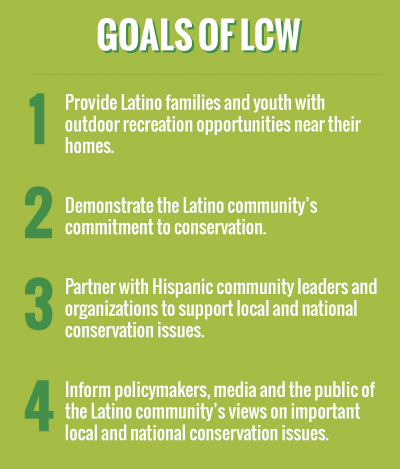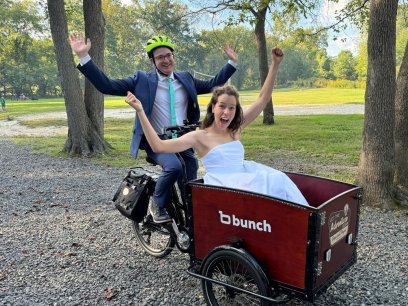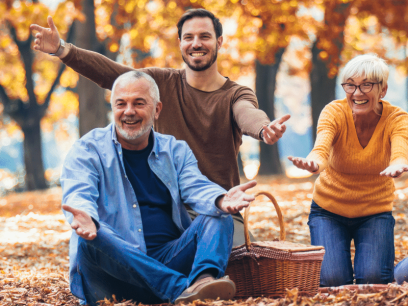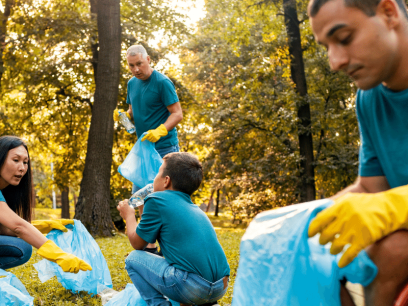
Every July, thousands of people across the country come together during Latino Conservation Week (LCW) to celebrate the ways in which Latino communities can work together to protect our natural resources.
From hikes in nature to community discussions and film screenings, LCW activities promote community-based conservation efforts and provide volunteer opportunities for Latinos to protect our land, water, and air.

LCW was created by the Hispanic Access Foundation (HAF) but today is a true collaborative effort between a wide range of community, non-profit, faith-based, and government organizations. Since its launch in 2014, LCW has grown from nine to nearly 200 events across the country.
“Latino Conservation Week’s growth has happened organically,” said Jessica Godinez, HAF Conservation Program Associate. “It speaks to how the mission resonates with community members across the country.”
Many People, One Mission
HAF works to improve the lives of Hispanic people living in the US through civic engagement, education, and access. Conservation is a big part of the organization’s mission because healthy communities begin with a healthy natural environment.
But while Latinos have shown strong support for protecting public lands and waters, they also face inequalities when it comes to access and representation in the outdoors. A 2021 study examining outdoor participation trends found that 75% of people who participated in outdoor activities in 2020 were white.
“Latinos represent the largest untapped segment of the population when it comes to outdoor recreation,” Godinez said.
Latino Conservation Week is a collaborative effort to elevate Latino voices in the outdoors, connect communities with the outdoors, and build bridges to ensure Latinos have a seat at the table on environmental issues.
Breaking Down Barriers to Outdoor Access
While sharing one unified goal, no two LCW events are the same. From hiking and dance lessons to yoga and concerts in the park, LCW reminds us that there are many ways to connect with the outdoors.
“Remember: there’s no right or wrong way to enjoy nature,” said Felipe Benítez, Executive Director of Corazón Latino. “Every community is different. Don’t try to fit the mold of what has worked with other groups.”
Successful LCW events consider potential barriers to participation. Does the event’s timing conflict with work or church commitments? Is the cost too much for an entire family? How will people get there? How will they find out about the event? Is the program culturally relevant?
“Keep in mind that different communities recreate in very different ways,” said Godinez.
Celebrating Connection at Rock Creek Park
Corazón Latino, a national non-profit organization that fosters natural resource stewardship in underrepresented communities, co-hosted a LCW event with the Hispanic Access Foundation in July 2021 that both celebrated nature and Latino culture.
De Corazón a Corazón: Música, Naturaleza y Cultura (Heart to Heart: Music, Nature and Culture) was held on July 18 at Rock Creek Park Nature Center in Washington, D.C. Conservation education was offered by partners including Rock Creek Conservancy and the US Forest Service. Attendees also enjoyed traditional paletas (popsicles), empanadas, and live music.
In the lead up to the event, Corazón Latino shared information with local groups to help get the word out. They also provided a bus to transport attendees from a nearby church to Rock Creek Park after their service finished.
The results speak for themselves.
“We counted 250 people in the community center—which blew our expectations out of the water,” Benítez said. “It is a good reminder how for Latino communities, nature is part of our DNA and tradition.
People of all ages—from abuelitos to young children—attended and were able to enjoy a range of activities honoring Madre Tierra (Mother Earth) that catered to all age groups. More than 50 people participated in a bilingual explorative hike led by a NPS Park Ranger. About half the participants said that this was their very first visit to a national park.
The event served as a reminder about the importance of inclusivity and empowering Latinos to see themselves as stewards of our public lands.
“It's not just about protecting the land and the water and air,” said Maite Arce, HAF Executive Director, told attendees. It’s also about the people. We are the ones who have the responsibility and opportunity to protect these places.”
Going Virtual to Expand Access to Nature
Corazón Latino’s Rock Creek Park event took on special meaning as an “intentional act of togetherness” amid the lingering impacts of the pandemic. But despite lockdowns and social distancing, the organization also found ways to expand access to the outdoors—virtually.
In September 2020, Corazón Latino, Toyota, and NEEF partnered to host a concert series on social media to safely celebrate National Public Lands Day. The “virtual road trip” featured a variety of genres and artists performing with iconic public lands across the US as a backdrop, from Massachusetts to California.
“This event showcased the diversity of the Latino community, on our public lands, with a nationwide audience,” said Nicole Randall, Director of Strategic and Corporate Partnerships at Corazón Latino. “It reminded viewers that they can engage with nature no matter where they are.”
Host Your Own Community Event
Are you interested in launching a community-based conservation movement of your own? Experts from HAF and Corazón Latino offer these helpful suggestions.
- Reach out to local leaders about your goals. Build relationships with existing, trusted organizations that serve the community.
- Be inclusive. Understand what makes your community unique. Incorporate the language, music, and food that makes people feel welcome. Offer programming that fits all age groups and abilities. “Create spaces where the community feels safe,” said Godinez.
- Get the word out. Try multiple strategies, from word of mouth to printer flyers, social media, and local news to share information about the event ahead of time.
- Understand the barriers that exist for your community and address them. “For example, consider the timing—make sure the event fits with work, church, and public transportation schedules,” said Benítez. LCW partners are encouraged to host events that are free or low-cost to the public, have appropriate transportation, are bilingual, and offer ways for communities to stay engaged in the future.
- Use digital media to expand access. “Virtual events are here to stay, and can expose people to national parks they didn’t even know existed,” said Randall.
- Be patient! Building trust—and starting a movement—takes time, but the benefits to the community will be worth the effort.
More Ways to Get Involved
This Hispanic Heritage Month, learn about ways to get involved in community-led conservation:
- Check out the Power of Parks for Health Roundtable Series, hosted by NEEF and the National Park Service Office of Public Health, discussing how to increase the visibility, representation, and relevancy of Hispanic communities in the outdoors.
- Watch NEEF’s recent webinar on engaging Spanish-speaking communities in the outdoors, featuring Felipe Benítez from Corazón Latino.
- Learn about past LCW events across the country and get inspired to host your own using the Hispanic Access Foundation’s event planning guides.


